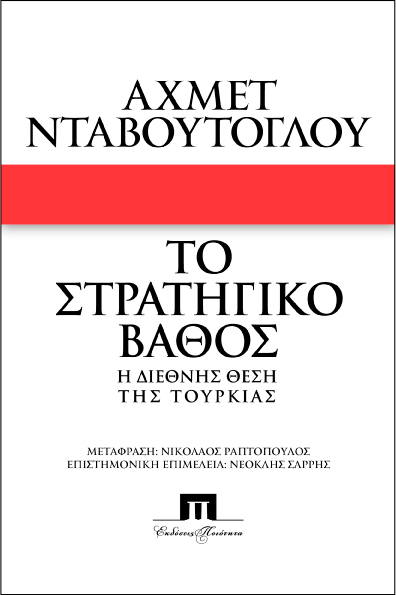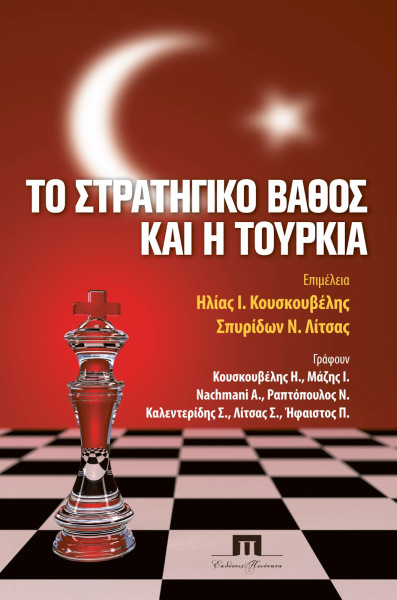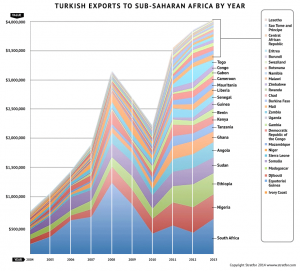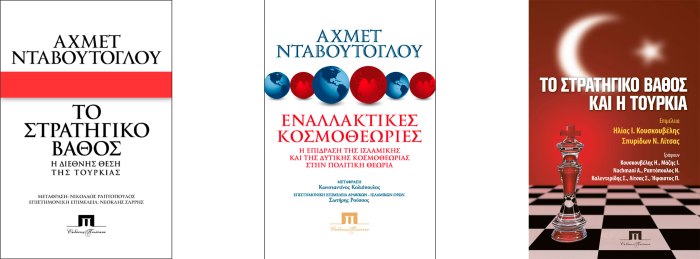Το τι κάνουν τα άλλα κράτη και ιδιαίτερα το τι κάνει η Τουρκία αφορά ζωτικά την Ελλάδα. Στα βιβλία του Αχμέτ Νταβούτογλου Το στρατηγικό βάθος. Η διεθνής θέση της Τουρκίας (σελίδα facebook) και Εναλλακτικές κοσμοθεωρίες. Η επίδραση της ισλαμικής και της δυτικής κοσμοθεωρίας στην πολιτική θεωρία (σελίδα facebook) καθώς και στο συλλογικό έργο Το στρατηγικό βάθος και η Τουρκία (επιμ. Η. Κουσκουβέλης, Σ. Λίτσας) (σελίδα facebook) για την τουρκική στρατηγική (βλ. και σελίδα στο facebook Τουρκική εθνική στρατηγική και Ελλάδα-Κύπρος), όπως γίνεται αντιληπτή μέσα από τα κείμενα των ισλαμιστών ηγετών έχουμε μια γενική εικόνα, το κοσμοθεωρητικό πλαίσιο, τους προσανατολισμούς και τους σκοπούς. Η Τουρκία είναι αναμφίβολα ένα πολιτικό και στρατηγικό καζάνι που κοχλάζει. Το άρθρο που ακολουθεί παρουσιάζει ενδιαφέρον καθότι δείχνει ότι οι εσωτερικές εξελίξεις και ιδιαίτερα η σύγκρουση των ισλαμιστών υπό τους Ερτογάν/Νταβούτογλου με το κίνημα Γκιουλέν ενέχει προεκτάσεις σε όλο το περιφερειακό σύστημα στο οποίο ανήκουμε. Το ζήτημα για το οποίο θα πρέπει εύλογα να διερωτηθούμε (βλ. και πρόσφατη ανάρτησή μας ) είναι κατά πόσο το Ελληνικό κράτος παρά τα προβλήματα που αντιμετωπίζουμε παρακολουθεί δεόντως τις εξελίξεις, αναλύει τα δεδομένα, προσδιορίζει διαρκώς σκοπούς και ακολουθεί στρατηγική εκπλήρωσής τους.



Turkey’s Feud With Gulenists Could Upset Its Africa Policy
April 19, 2014 | 1101 GMT

Turkish Prime Minister Recep Tayyip Erdogan (L) meets Senegalese President Macky Sall (R) on Jan. 10, 2013 in Dakar.
Attempts by the Turkish government to curtail organizations and schools abroad linked to the Fethullah Gulen movement could undermine Ankara’s diplomatic relations with African countries. Gulen’s global religious network, known as Hizmet, calls for an interpretation of Islam that blends traditional values with modernity. Unlike Azerbaijan and the Kurdistan Regional Government in Iraq, where Turkey maintains deeper strategic interests, African countries with weaker ties to Ankara will be more reluctant to give up the developmental assistance they have received from Hizmet.
Analysis
Turkey’s efforts to broaden its presence in Africa through trade and investment moved forward April 11, when Senegal established a business council with the republic. On April 9, Kenya opened an embassy in Ankara and signed several agreements on trade and security cooperation. However, the growing conflict between the Hizmet movement and Turkish Prime Minister Recep Tayyip Erdogan’s Justice and Development Party has the potential to damage or even reverse potential gains in Africa. This developing rift prompted Erdogan to order Turkish schools run by Gulenists overseas to be shut down. Problematically, Hizmet nongovernmental organizations and schools have over time become the main conduit for Turkish “soft power,” enabling Ankara to establish and maintain relations with African states.
Turkey’s activity in Africa over the past decade, most notably in East Africa in recent years, has largely depended on Hizmet organizations providing humanitarian aid, education and healthcare. This presence has enabled many deals such as trade agreements, direct investment by Turkish industry, support in the United Nations and even security cooperation between Turkey and African countries. As a result, there has been a 527 percent increase in the value of Turkish exports to sub-Saharan Africa and a 189 percent increase in the value of imports over the last decade. The percentage of Turkish exports to sub-Saharan Africa has also doubled in the last 10 years.

Image: Turkey’s Trade with Africa
Turkish schools run by Gulenists in Africa often provide a higher standard of education than local schools and are seen by African leaders as a good method of educating the future elite. The global Hizmet school system is also an important source of revenue for the Gulen movement, which is one of the reasons Erdogan’s Justice and Development Party perceives it as a threat.
Erdogan’s Rift With the Hizmet Movement
Erdogan initially benefited from an alliance with the Gulenists during his moves to defang the Turkish military establishment and garner support in the West. However, the Justice and Development Party has since distanced itself from Hizmet, leading the Gulenists to eventually break with Erdogan’s faction. Having consolidated control over Turkey, confirmed by a recent electoral victory, Erdogan now faces the challenge of trying to purge Hizmet’s influence.
After passing a bill to close preparatory schools in Turkey, many of which belong to Hizmet organizations, Erdogan tasked Turkish Foreign Minister Ahmet Davutoglu with curtailing Hizmet activity abroad. A Turkish school established by Hizmet in Gambia in 2010 has already been shut down at Davutoglu’s request. According to Gulenist media, the request was backed by an offer of $500 million for the Gambian state. Davutoglu has pressured Azerbaijan, Kurdistan and Pakistan to shut down Hizmet schools as well. The degree to which they acquiesce will be telling; Azerbaijan has already fired a top official over ties to the Gulenist movement. Azerbaijan needs to balance against Russia and Iran in the Caucasus, while the Kurdistan Regional Government desperately needs Turkish backing to stand up to Baghdad.
South Africa has allegedly been pressured to close its Hizmet schools. However, South African President Jacob Zuma recently pledged his continued support to the Star College group, which runs Hizmet schools that cater to approximately 3,000 South African students. The schools have been in the country for 15 years.
Erdogan may be able to pressure Azerbaijan or the Kurdistan Regional Government into supporting him in his feud with the Gulenists, but African countries benefit from both Turkish government activity and Hizmet activity and do not depend heavily on Turkey. For this reason, African countries have the freedom to cut ties with Ankara. If Turkey’s pressure on African countries to end Gulenist activity goes too far, Ankara’s interaction with those countries could suffer.
The Benefits of Hizmet Activity in Africa
The “soft power” of the Gulenist presence in Africa was instrumental to supporting Turkey’s Africa policy. In places such as Somalia, Hizmet nongovernmental organizations and schools still make up the majority of the Turkish presence. Hizmet organizations like the Turkish Confederation of Businessmen and Industrialists have also directly facilitated Turkish investment in Africa by organizing trade fairs across the continent. Such groups orchestrate the transport of Turkish businessmen to Africa and arrange introductions for entrepreneurs, policy makers and other nongovernmental organizations.

Image: Turkey’s Biggest Trade Partners
For many African states, the benefits gained through the Turkish schools, which ultimately facilitate access to prestigious Western universities, and the Gulenist humanitarian aid heavily outweigh the importance of direct relations with the Turkish government, as was demonstrated by Zuma’s recent pledge. Because of its level of development in comparison to some of its neighbors, South Africa is less impressed by Turkish promises of investment than it is by the benefits of advanced education.
Erdogan’s attempts to shut down Hizmet activity abroad, especially the revenue-generating elements, may not necessarily stop Turkey’s expanding involvement in Africa. However, it will definitely make it harder for the Turkish government to retain the goodwill created by the Gulenists and may even risk breaking existing ties if local governments are pressured to take action against Hizmet activities. If this occurs, Turkey may face setbacks in its access to Africa’s natural resources, which make up the largest share of Turkey’s imports from the continent. More important, a breakdown in diplomatic relations could affect access to African markets for Turkish exports and to low-cost labor that benefits the Turkish manufacturing sector.


